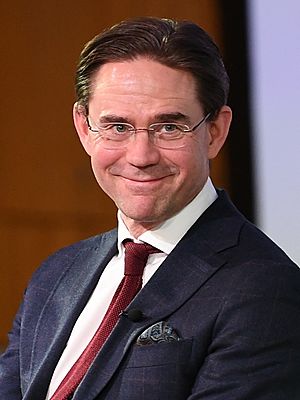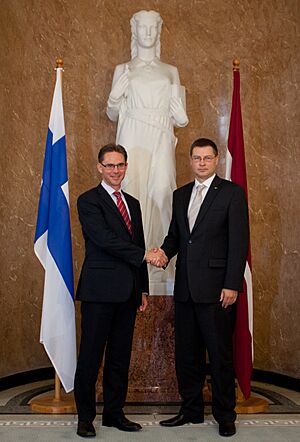Jyrki Katainen facts for kids
Quick facts for kids
Jyrki Katainen
|
|
|---|---|

Katainen in 2023
|
|
| European Commissioner for Jobs, Growth, Investment and Competitiveness | |
| In office 1 November 2014 – 30 November 2019 |
|
| President | Jean-Claude Juncker |
| Preceded by | Ferdinando Nelli Feroci (Industry and Entrepreneurship) |
| European Commissioner for Economic and Monetary Affairs and the Euro | |
| In office 16 July 2014 – 1 November 2014 |
|
| President | José Manuel Barroso |
| Preceded by | Siim Kallas (Acting) |
| Succeeded by | Pierre Moscovici (Economic and Financial Affairs, Taxation and Customs) Valdis Dombrovskis (Euro and Social Dialogue) |
| 42nd Prime Minister of Finland | |
| In office 22 June 2011 – 24 June 2014 |
|
| President | Tarja Halonen Sauli Niinistö |
| Deputy | Jutta Urpilainen Antti Rinne |
| Preceded by | Mari Kiviniemi |
| Succeeded by | Alexander Stubb |
| Deputy Prime Minister of Finland | |
| In office 19 April 2007 – 22 June 2011 |
|
| Prime Minister | Matti Vanhanen Mari Kiviniemi |
| Preceded by | Eero Heinäluoma |
| Succeeded by | Jutta Urpilainen |
| Minister of Finance | |
| In office 19 April 2007 – 22 June 2011 |
|
| Prime Minister | Matti Vanhanen Mari Kiviniemi |
| Preceded by | Eero Heinäluoma |
| Succeeded by | Jutta Urpilainen |
| Personal details | |
| Born |
Jyrki Tapani Katainen
14 October 1971 Siilinjärvi, North Savo, Finland |
| Political party | National Coalition Party |
| Spouse | Mervi Kuittinen |
| Children | 2 |
| Alma mater | University of Tampere |
| Signature |  |
| Military service | |
| Allegiance | |
| Branch/service | Finnish Army |
| Years of service | 1989–1990 |
| Rank | Senior 1st Lieutenant |
Jyrki Tapani Katainen (born October 14, 1971) is a Finnish politician. He served as a Vice-President for Jobs, Growth, Investment and Competitiveness from 2014 to 2019. Before this, Katainen was the Prime Minister of Finland from 2011 to 2014. He also led the National Coalition Party from 2004 to 2014. After leaving his role as Prime Minister, he became a Vice-President in the European Commission.
Contents
About Jyrki Katainen
Early Life and Education
Jyrki Katainen was born in Siilinjärvi, a town in Finland. He finished high school in 1990. He then earned a master's degree in political science from the University of Tampere. During his studies, he spent a year at the University of Leicester in England as an exchange student.
Family and Hobbies
Jyrki Katainen has two daughters, Saara (born in 2005) and Veera (born in 2009). Besides Finnish, he can speak English, French, and Swedish. He is also known for being a good chef.
Katainen's Political Journey
Starting in Politics
Jyrki Katainen began his political career after working briefly as a teacher. His first political job was in 1993, as a member of the Siilinjärvi town council. In 1999, he was elected to the Finnish Parliament. He became the vice-chairman of the National Coalition Party in 2001 and its leader in 2004.
European Roles
From 1990 to 2000, Katainen was a vice-president of the Youth of the European Peoples Party. He was also elected vice-president of the European People's Party (EPP) in 2006 and again in 2009.
Becoming Finance Minister
In the 2007 election, Katainen's National Coalition Party came in second place. He then became the Minister of Finance and Deputy Prime Minister. He served in a government that included the Center Party, the National Coalition, the Greens, and the Swedish People's Party.
As Finance Minister, Katainen spoke about the need for European leaders to prepare people for difficult economic changes. He said that even though it would be hard, they had to make tough decisions as economies started to get better.
Prime Minister of Finland (2011–2014)

After the parliamentary election in April 2011, Katainen was chosen as Prime Minister. He officially took office on June 22, 2011. His party, the National Coalition Party, became the largest party in Finland for the first time ever. His government was made up of six different parties.
Economic Challenges and Reforms
In August 2013, Katainen held a meeting to discuss how to improve Finland's economy. He wanted to find ways to make big changes to help the country's finances. He noted that people were curious and committed to finding solutions.
Finland faced economic problems, and the government needed to make reforms. However, some parties in the government disagreed on these changes. In September 2013, the government announced plans for reforms. Katainen, however, warned that these changes might not be enough.
In November 2012, Katainen's government decided that Finland would not join other EU countries in proposing a financial transaction tax. This was a difficult decision because three of the six parties in his government supported the tax.
Katainen also spoke about the importance of investing in Finland. He highlighted the country's excellent education system and stable political environment. He encouraged universities to get involved in society to help Finland compete better globally.
He mentioned that big companies like Google, Yandex, and Microsoft were investing in Finland. However, he also noted that Finland was still losing more jobs than it was creating. In November 2013, Katainen said Finland needed more foreign investment to boost its economy and create jobs. He emphasized the importance of the ICT sector, including data centers.
Views on the European Union
As Prime Minister, Katainen believed that European leaders needed to bring the European Union closer together. He felt that the euro zone debt crisis had caused disagreements between countries. He worried that this could weaken the unity of the 28-nation group.
Katainen also said that calls for more European involvement were not popular. This was because people were worried about losing their jobs and their standard of living due to globalization.
He believed that new budget rules and a banking union had helped stabilize the euro zone. When asked about changing the EU treaty, Katainen said he was practical. He thought most of what Europe needed could be achieved by making its internal market stronger.
Katainen also stressed that national governments were responsible for important reforms. These included changes to pensions, job markets, and education. These reforms were needed to keep European countries competitive.
He also called for a single market for clean technology. He pointed out that Finland was making advanced biofuels. However, these could not enter some EU countries because laws had not kept up with new inventions.
Regarding the situation in Ukraine, Katainen stated that Finland would not impose economic sanctions on Russia. He advised leaders to remain calm about the situation in Crimea. He believed that sanctions could harm Finland's economy.
Vice-President of the European Commission (2014–2019)

Jyrki Katainen stepped down as Prime Minister of Finland in June 2014. He was then chosen to be a European Commissioner on July 16, 2014. He was later confirmed as the Vice-President for Jobs, Growth, Investment and Competitiveness in the European Commission.
In this new role, Katainen's job was to suggest ways for countries to achieve steady economic growth and create jobs. He also oversaw the euro, Europe's common currency. He helped produce regular economic reports and indicators for the Commission.
A Swedish politician, Marita Ulvskog, said that Katainen's strength was coming from a Nordic country. She believed he understood the importance of working with different groups in the job market. She said that the Euro crisis could not be solved without everyone working together. Katainen was given the task of finding €300 billion to invest in the European Union's growth and economy.
In a 2015 interview, Katainen said that "investment is truly a golden thread." He meant that investing in people, partnerships, and the planet was very important. This included giving people the skills for the modern economy. It also meant helping people move freely within and outside the EU. This would support economic growth and protect against outside threats.
Before the 2019 European Parliament election, Katainen was considered a possible candidate for President of the European Commission. However, in June 2018, Katainen announced that he would not seek the position. He said he planned to leave politics after his term in the Commission ended.
Life After Politics
After leaving politics, Jyrki Katainen became the president of SITRA for five years. In June 2023, he was named the head of public affairs for the financial group Nordea.
Images for kids
See also
 In Spanish: Jyrki Katainen para niños
In Spanish: Jyrki Katainen para niños
 | Laphonza Butler |
 | Daisy Bates |
 | Elizabeth Piper Ensley |



